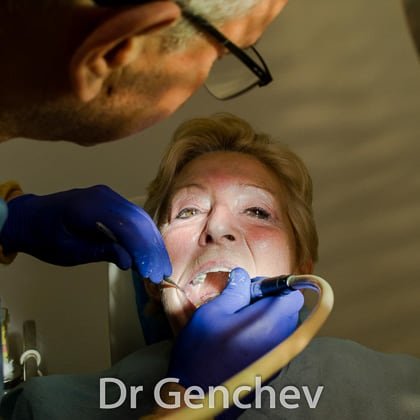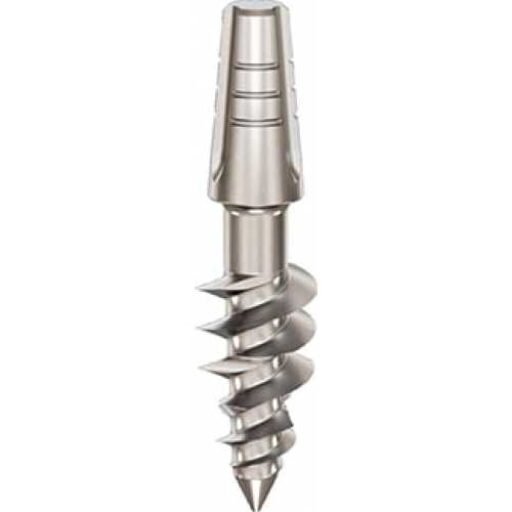What are zygomatic dental implants?
Zygomatic implants are used for the dental rehabilitation of the upper jaw for patients that suffer from severe bone loss. They are also called zygoma implants.

It is mainly conventional implant dentists who use zygomatic dental implants to avoid sinus lift and bone grafting. Basal implant dentists prefer Pterygoid dental implants that are positioned behind the sinuses. But this technique requires additional qualifications and experience.
Zygomatic dental implants are anchored into the zygomatic cheekbone. They are often used by conventional implantologists who practise All-on-4 or All-on-6. All-on-4 Xtra is an upgrade on these dental restoration systems. Pterygoid dental implants are used instead of the zygoma implants to resolve the issue of bone loss on the upper jaw
What are the risks of zygomatic implants?
Zygomatic implants require additional training and experience. Only a qualified and experienced implant dentist should perform this procedure. Some of the most common complications associated with zygomatic implants include pain and discomfort in the upper jaw, bruising and swelling around the implant and infection due to poor oral hygiene. There are risks of temporary sensory nerve deficits, orbital injury. There is also a danger that the zygomatic implant is not integrated into the zygomatic bone where it is anchored.

But, the most common side-effect is chronic sinusitis. The zygomatic implant passes from the mouth to the closed cavity of the sinuses. It brings bacteria passing from the mouth to the sinuses that results in an infection of the sinuses that can become chronic. Chronic sinusitis can be treated with antibiotics. In some cases it needs to be treated with functional endoscopic sinus surgery. The lack of osseointegration can be treated by the removal of the implant and bone grafting.
Comparison between zygomatic and pterygoid dental implants?
Zygomatic implants are placed through the sinuses whilst pterygoid implants are anchored behind the sinuses in the pterygoid process of the sphenoid bone.
The advantages of pterygoid implants
Pterygoid dental implants are a better solution for a full dental restoration of the upper jaw with severe bone atrophy because it avoids the risk of chronic sinusitis.
Pterygoid Dental Implants

Behind the sinuses

Full set of 14 crowns
Zygomatic Dental Implants

Risk of sinusitis

Less implants
Dr Genchev
Free Dental Consultation
Dr. Genchev is one of the leading implant dentists for full mouth dental restoration with basal dental implants. He does need to perform a sinus lift to restore the upper jaw.
He has extensive experience helping patients that suffer from edentulism tooth loss with severe bone loss as well as periodontitis advanced gum disease.

Ask Dr Genchev for a free consultation
Request a Call Back
Fast Response
For a fast response please call Dr Genchev for free directly via WhatsApp or send him an email.
Advice on zygomatic implants
How to find a good basal implant dentist for a full dental restoration with zygomatic dental implants?
Contact us for free advice. We will help find the appropriate dental implant surgeon for full mouth dental restoration with basal dental implants based on your dental condition, location and budget.
Not all dentists are equal. Basal implantology with basal implants requires additional qualifications. And not all qualified basal implantologists are sufficiently experienced to treat patients with severe bone atrophy. We can help you find the right implant dentist.
And when you find a dental implant surgeon ask for before and after photos of his patients. Check his diplomas. And check his previous experience by analysing the OPG panoramic x-rays of the patients he treated and compare it to your own volume of jaw bone. We can help you check if you have an appropriate basal implant dentist.
Alternatives to zygomatic dental implants
There are several alternatives to zygomatic dental implants. Some have their draw-backs.

Pterygoid implants
Pterygoid implants are fixed behind the sinuses to complete the strategic implantation.

Bone Graft
No bone graft needed because it often fails for edentulous patients with severe bone loss.

Sinus Lift
Sinus lift can cause chronic sinusitis. Basal implants avoid the need for lifting the sinuses.
All this information is provided solely as educational content. It is not medical advice. Our aim is to clarify and democratise medical terminology and concepts relating to dental implantology and full mouth dental restoration. For medical advice please consult multiple qualified implant dentists and compare their answers.
